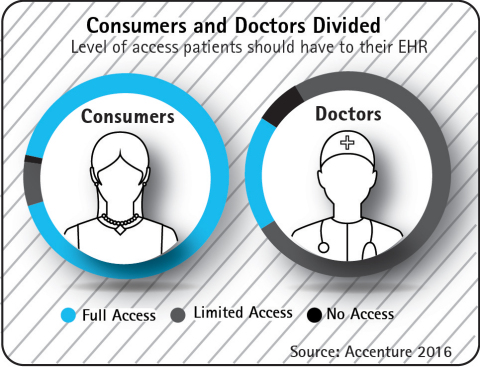CHICAGO--(BUSINESS WIRE)--A new survey by Accenture (NYSE:ACN) found that the divide between U.S. consumers and doctors who believe that patients should have full access to their own electronic health records (EHRs) has widened from two years ago – with patients now five times as likely as doctors to believe that patients should have full access to their records.
While the findings show that the number of consumers who believe they should have full access to their records has increased over the past two years—from 84 percent in 2014 to 92 percent today – the number of doctors who shared that belief dropped significantly, from 31 percent to 18 percent, during the same period.
These U.S. findings – part of a seven-country survey of roughly 8,000 consumers, including 2,225 in the United States – also found that the number of patients who know exactly what data they can access in their EHRs has increased by more than 50 percent over the past two years, from 39 percent in 2014 to 65 percent today.
“Until now, the flow of clinical information has been to the doctor,” said Kaveh Safavi, M.D., J.D., who leads Accenture’s health practice globally. “With digitization driving a new level of information parity, doctors need to embrace – not resist – the notion of patients having complete access to their records.”
The Accenture survey also found that most consumers (77 percent) want to see exactly what the doctor sees – not a summary. However, significantly more consumers are likely to access their EHR to stay informed than they are to help with making medical decisions (41 percent vs. 6 percent). The areas cited most often by consumers for using their EHRs to manage their health include having access to lab results (41 percent) and having access to their physician’s notes about the visit (24 percent).
Consumers have strong views on who should access their EHR data. While three-fourths view an EHR as a tool for their primary doctor, fewer than 1 in 30 consumers believe that an employer or government organization should have access to their records (each cited by only 3 percent of respondents), and fewer than 1 in 10 (9 percent) believe that a retail clinic should have access to their records.
In addition, the majority of consumers believe they should be able to update certain information in their EHR, including family medical history (cited by 89 percent), new symptoms (87 percent), demographic information (86 percent), changes in symptoms (86 percent) and personal medical history (83 percent). The number of doctors who believe patients should also be able to update various elements of their own records was similar to that for consumers.
“When health information is completely transparent, the relationship between a doctor and patient grows stronger,” added Safavi. “The more a patient understands about themselves, the more they can take an active role in managing their own health.”
Methodology
Accenture commissioned a survey of roughly 8,000 consumers in seven countries to assess their adoption and attitudes toward digital health tools, electronic health records and their healthcare providers’ electronic capabilities. The seven countries represented were the United States (2,225 respondents), Australia (1,013), Brazil (1,006), England (1,009), Norway (800), Saudi Arabia (852) and Singapore (935). The survey was conducted by Nielsen between November 2015 and January 2016. Where relevant, the survey refers to select findings from a similar physician survey to compare doctor and consumer responses.
About Accenture
Accenture is a leading global professional services company, providing a broad range of services and solutions in strategy, consulting, digital, technology and operations. Combining unmatched experience and specialized skills across more than 40 industries and all business functions – underpinned by the world’s largest delivery network – Accenture works at the intersection of business and technology to help clients improve their performance and create sustainable value for their stakeholders. With approximately 373,000 people serving clients in more than 120 countries, Accenture drives innovation to improve the way the world works and lives. Visit us at www.accenture.com.

